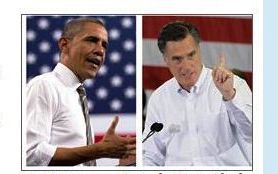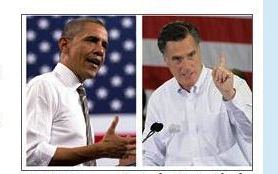U.S. Election Debate Leave Africa Out

Yet, the ears of the world are tuned in to U.S. politics, as people listen and watch the spectacle of American democracy in action, the attack ads in the media, the machinations of Super PACs and money wars, plus the will of voters to vote as they please, to elect the leader of the free world.
In Africa, many a nation aspires to this sort of freedom and liberty, while others despise it. That’s for another day.
But foreign policy is almost always certain to come up in some fashion, even when the central issue seems to be about the U.S. economy. Writing in the Washington Post, Michael Gerson, speechwriter for the former president, George W. Bush says, “Ignoring foreign policy won’t make it go away.”
Gerson thinks the foreign policy is “off the table” in the current election, largely in part because “Obama has not only continued George W. Bush’s global war on terrorism — whatever it is currently called — but has also expanded its scope and lethality.”
Foreign policy in 2012 is background music, according to Samuel R. Berger, writing in Foreign Policy magazine. Berger is a former U.S National Security Adviser to President Bill Clinton.
“Romney’s choice of Ryan reflects that the 2012 campaign is all about domestic issues – the economy, unemployment, and taxes – and not about war or terrorism,” wrote Plilip Ewing of the political website POLITICO
With Africa being such a distant foreign policy issue, who really cares about Africa when America suffers from crushing debt and unemployment at home?
So, let’s ask another question. Can Africa be stupid in 2012?
While the Obama administration is making efforts to deal with African issues; terrorism in the horn of Africa, food security in Africa, and efforts to deal with HIV and AIDS, it is being criticized for not paying much attention to the continent.
Critics have tried to measure the works of the Obama team thus far, to that of the George W. Bush administration, as well as that of Bill Clinton. Both Bush and Clinton served eight years in office respectively. Obama is a few months short of completing four years as president.
Obama has made just one trip to Africa, as president. That was in July 2009, six months after taking office. That trip took Obama to sub-Saharan Africa; to Ghana, for a one-night stopover. First lady Michelle Obama traveled to Botswana and South Africa in June 2011 “to engage African youth in leadership, education, health and wellness.”
Recently the administration issued a Presidential Policy Directive on Africa, solicited public input about Africa and hosted a discussion on U.S Policy Toward Sub Saharan Africa.
Secretary of State, Hilary Clinton has toured seven African nations recently. While the trip was considered an attempt to thwart Chinese influence in Africa, the bloggers at DipNote, the U.S. Department of State official blog, said, “Throughout the trip, Secretary Clinton will emphasize U.S. policy commitments outlined in the Presidential Policy Directive — to strengthen democratic institutions, spur economic growth, advance peace and security, as well as promote opportunity and development for all citizens.”
The administration may, or may not get the opportunity to fully implement its Africa policy if the election turns out otherwise. Obama has said he looks forward to another opportunity to travel to Africa as president.
Can Romney-Ryan fix “Obama’s Failure” in Africa?
As for Mitt Romney, it is not clear what he is up to, on Africa. Right now there is not enough data about possible Africa policy plans that a Romney administration might pursue. But the candidate has a page devoted to Africa.
In an “Overview”, Team Romney states that they are optimistic about “a great promise” in Africa, despite many years of conflict, poverty, and misrule that followed the independence of many African nations.
“African countries hold great promise despite the many years of conflict, poverty, and misrule that followed their emergence as independent states,” the campaign website stated.
While this may not reflect everything in the candidates’ thinking on Africa, they seem concerned about Chinese efforts there, extremism and piracy in Somalia, terrorists in Nigeria and “inept regimes” in Sudan, Zimbabwe and the Democratic Republic of Congo.”
“While Africa is changing, global competitors like China are taking advantage of these changes and are rapidly outmaneuvering the United States by making strategic inroads throughout the continent and gaining an economic and political advantage over the United States,” the website stated.
The campaign is critical of the Obama administration in what it says is “Obama’s Failure”; failure to confront “ongoing atrocities by the dictatorship in Khartoum”, failure to strengthen “a once-promising alliance with South Sudan”, threats from al-Qaeda linked terrorist groups in Somalia, human rights abuses in the Congo, as well as efforts by China to supplant U.S. efforts in the continent.
The campaign promises to bolster economic ties with African nations, improve access to African markets, and help fight corruption in Africa. On the issue of security and human rights, “Mitt Romney will also provide the leadership required to help resolve Africa’s long-running conflicts, pressure the remaining despots who abuse their own people and weaken terrorist groups that threaten U.S. interests and those of our partners,” the Romney website stated.
In October 2011, the Campaign announced Tibor Nagy as Africa chair of the Africa Working Group for the Romney Foreign Policy and National Security advisory team. Nagy, a former U.S. Foreign Service worker, is currently vice provost for International Affairs at Texas Tech University. Nagy has also been U.S. ambassador to Ethiopia and Guinea.
Robert Zoellick, who recently served as World Bank president, is rumored to be “the new head of the team planning national-security appointments” for the Romney campaign.
But what do Africans know about Mitt Romney, the candidate?
In “A South African Take on the U.S Race”, Moeletsi Mbeki, Deputy Chairman, South African Institute of International Affairs, told the U.S Council of Foreign Relations that Africans knew nothing about Mitt Romney until he started running against Obama.
The candidate traveled in London, Israel and Poland in July as a way to help boost his foreign policy credentials. Writing in the Atlantic Council, “ROMNEY’S NOT OBAMA DOCTRINE”, Julian Lindley-French, Eisenhower Professor of Defence Strategy at the Netherlands Defence Academy, wonders what the candidate’s worldview is.
“What does Mitt Romney’s recent foreign tour say about a future President Romney’s foreign and security policy? Can the beginnings of a Romney Doctrine be discerned?
French concludes that “Romney will need a big foreign policy idea and soon.”
Romney chose Europe as his destination for a foreign policy trip. Obama did the same in 2008. Why Obama and Romney chose Europe and not Africa for a trip to boost their foreign policy credentials is not known. A reaction to both candidates’ European trips is captured here.
Comparing Romney’s trip to Europe to that of Obama four years ago, The New York Times’s Ashley Parker in “A Different Continent, A Different Tune”, writes: “In a contrast to Mr. Obama’s trip to Europe as a candidate four years ago, which drew giant crowds, Mr. Romney’s trip has gotten relatively little attention here — scrutinized though it was — and seemed to hold less import for some citizens and leaders.”

